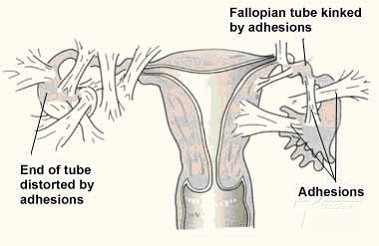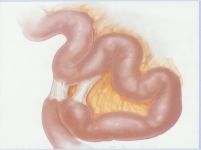What symptoms are caused by adhesions?
Adhesions in the abdomen pull on parts of the intestines and sometimes cause an obstruction. Symptoms may include:
- pain
- cramps
- intermittent vomiting
- difficulty with passing gas or having a bowel movement
- swelling of the abdomen
Symptoms vary depending on the tissues involved. For example, in the gastrointestinal tract, bowel obstructions may occur.
Mechanical small bowel obstruction after previous surgery can be the most severe effect of adhesions. In the uterus and in the pelvis, adhesions can cause infertility and other reproductive problems. The adhesions can block the ends of the fallopian tubes causing infertility.

Doctors associate signs and symptoms of adhesions with the problems an adhesion causes rather than from an adhesion directly. As a result, people experience many complaints based on where an adhesion forms and what it may disrupt. Typically, adhesions show no symptoms and go undiagnosed. These adhesions cause no problems at that moment , but they can obstruct the intestine in about 2 percent of all patients. These obstructions can occur several years later. Most commonly, adhesions cause pain by pulling nerves, either within an organ tied down by an adhesion or within the adhesion itself.
- Adhesions above the liver may cause pain with deep breathing.
- Intestinal adhesions may cause pain due to obstruction during exercise or when stretching.
- Adhesions involving the vagina or uterus may cause pain during intercourse.
- It is important to note that not all pain is caused by adhesions and not all adhesions cause pain.
- Small bowel obstruction (intestinal blockage) due to adhesions is a surgical emergency.
- These adhesions trigger waves of cramplike pain in your stomach. This pain, which can last seconds to minutes, often worsens if you eat food, which increases activity of the intestines.
- Once the pain starts, you may vomit. This often relieves the pain.
- Your stomach may become tender and progressively bloated.
- You may hear high-pitched tinkling bowel sounds over your stomach, accompanied by increased gas and loose stools.
- Fever is usually minimal.
- Such intestinal blockage can correct itself.
However, you must see your doctor. If the blockage progresses, these conditions may develop:
- Your bowel stretches further.
- Pain becomes constant and severe.
- Bowel sounds disappear.
- Gas and bowel movements stop.
- Your belly will grow.
- Fever may increase.
- Further progression can tear your intestinal wall and contaminate your abdominal cavity with bowel contents
Intra-abdominal adhesions are usually the result of surgical or gynecologic operations, pelvic inflammatory disease (gonococcal or chlamydial), appendicitis or endometriosis. Adhesions may be responsible for chronic persistent abdominal pain without associated pelvic pathology. Though adhesions probably cause pain by entrapment of expansile viscera, the relationship of adhesions to abdominal pain is still controversial. In contrast, mechanical small bowel obstruction after previous surgery demonstrates unequivocally the most severe effect of adhesions. Patients with chronic or recurrent abdominal pain and a history of numerous abdominal surgical procedures are often denied treatment if they are not obstructed or symptomatic of intermittent bowel obstruction. Read more






